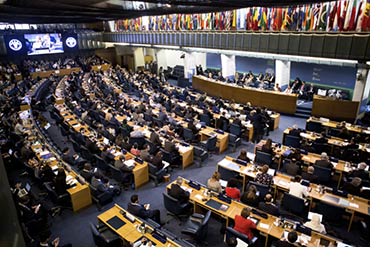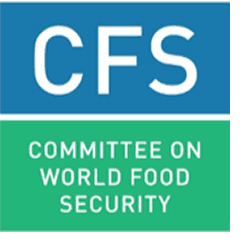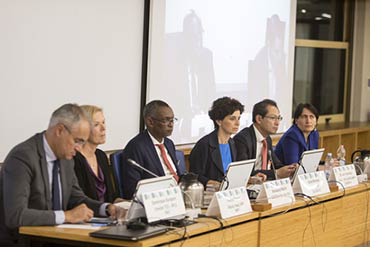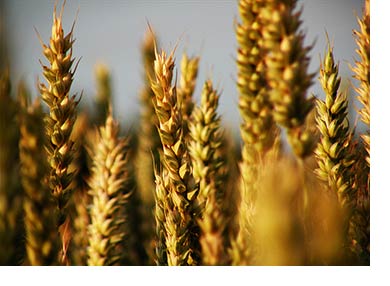|
// All roads lead to Rome: Key take-away messages from the 45th Session of the Committee on World Food Security (CFS)

 From 15-19 October 2018, the 45th session of the Committee on World Food Security (CFS45) took place at FAO headquarters in Rome, Italy. More than 1,600 delegates, representing CFS Members, non-Member States, UN agencies and bodies, civil society and private sector organisations, international finance and research organisations, philanthropic foundations and observers attended the session. Of course, numerous members of the Global Donor Platform for Rural Development were present at CFS45, either as delegates and/or convenors of side events.
From 15-19 October 2018, the 45th session of the Committee on World Food Security (CFS45) took place at FAO headquarters in Rome, Italy. More than 1,600 delegates, representing CFS Members, non-Member States, UN agencies and bodies, civil society and private sector organisations, international finance and research organisations, philanthropic foundations and observers attended the session. Of course, numerous members of the Global Donor Platform for Rural Development were present at CFS45, either as delegates and/or convenors of side events.
Major plenary sessions focused on the “State of Food Security and Nutrition (SOFI) 2018”, the “State of Food and Agriculture (SOFA) 2018” and looked at “Critical and Emerging Issues in Food and Security”. The reports provided a good overview, but most importantly, they made clear where there is a need for action from the international community. In his opening speech, José Graziano da Silva, FAO Director General, affirmed that there is no time to lose: "The need to act on nutrition is pressing; otherwise, hunger will undermine the 2030 Agenda.”
The Secretariat of the Global Donor Platform was on site to report on some highlights of CFS45. In addition to the major plenary sessions, the Secretariat attended a number of side events that were organised by Global Donor Platform members and collected the key take-away messages. Whether the role of women to increase resilience to climate change, the whole issue of the private sector involvement and inclusive agribusiness or the role of agroecology for sustainable development – the events gave an insight into the range of topics that donors are dealing with.
Read more on our special pages for CFS45:
 All Roads Lead to Rome: 45th Session of the Committee on World Food Security All Roads Lead to Rome: 45th Session of the Committee on World Food Security
# # #
// Thinking in networks, acting together: Partnerships combine strengths for a common goal
 “Breaking up with silo-thinking” was a phrase frequently heard in the plenary as well as on corridors during CFS45. Due to the complexity of challenges, there was consensus that one-fits-all-strategies are unrealistic. Working towards food security requires major transformations across issues and sectors that can only be achieved by building bridges between disciplines, people and territories. This brings the topic of partnerships to the fore and with it SGD 17 that appeals to creating partnerships.
“Breaking up with silo-thinking” was a phrase frequently heard in the plenary as well as on corridors during CFS45. Due to the complexity of challenges, there was consensus that one-fits-all-strategies are unrealistic. Working towards food security requires major transformations across issues and sectors that can only be achieved by building bridges between disciplines, people and territories. This brings the topic of partnerships to the fore and with it SGD 17 that appeals to creating partnerships.
A promising example for this kind of intersectoral collaboration is the Global Network against Food Crises (GNFC). The network was established by Global Donor Platform members EU, FAO and World Food Programme, as partners, to improve global coordination for prevention and response to food crises. It reports annually on the status of current food crises worldwide. According to the 2018 Global Report on Food Crises, almost 124 million people across 51 countries faced crisis levels of acute food insecurity or worse in 2017 – in 60 percent of cases conflicts were seen as main drivers of acute hunger. A side event convened by EU and FAO emphasised the need to strengthen collaboration between humanitarian and development actors to address food crises. It illustrated how important jointly identified priorities are in developing sustainable solutions to food crises.
Collaborations have also a strong role to play when it comes to improving the quality of food systems. How this looks like was shown at another side event that was hosted by DFID and FAO. With reference to concrete examples, the event was able to demonstrate that focused, determined and sustained actions by governments and businesses are crucial to support food environments to promote healthy, nutritious diets.
Read the full story on our website:
 Working towards food security, moving away from silo-thinking Working towards food security, moving away from silo-thinking
 Global Report Against Food Crises (PDF) Global Report Against Food Crises (PDF)
# # #
// Defining land governance priorities for 2019
 The Platform’s Global Donor Working Group on Land held its 12th physical meeting during the CFS in October, reflecting on the Group’s achievements in 2018 and defining priorities for 2019. Under the chairmanship by Harold Liversage (IFAD) in 2018, the Land Group welcomed two new members: the private foundation and philanthropic investor Omidyar Network and the multilateral AfDB. Now, under the leadership of the new chair, Chris Penrose Buckley from DFID, the Group will define priorities for collective action in 2019, an exercise to be finalised until early next year.
The Platform’s Global Donor Working Group on Land held its 12th physical meeting during the CFS in October, reflecting on the Group’s achievements in 2018 and defining priorities for 2019. Under the chairmanship by Harold Liversage (IFAD) in 2018, the Land Group welcomed two new members: the private foundation and philanthropic investor Omidyar Network and the multilateral AfDB. Now, under the leadership of the new chair, Chris Penrose Buckley from DFID, the Group will define priorities for collective action in 2019, an exercise to be finalised until early next year.
Already during the meeting, a number of priorities were highlighted. The Land Group will continue to support the re-classification of the SDG land indicator from Tier II to Tier I, and a new policy brief is under preparation. The policy brief will draw attention to the status of data availability on country-level – data for Africa is well covered, but there are still significant gaps in Asia and Latin America – and what is needed to prepare more countries for reporting by 2020.
Better donor coordination at country level – and between donors and national partners – also remains as a priority. At the occasion of the CFS, several members of the Land Group met with representatives of the African Union (AU) to discuss ways to improve collaboration in projects in Africa, particularly in continued dialogue with the Africa Land Policy Centre (ALPC).
Other areas of interest, for which concrete actions will have to be better defined in the coming weeks, are private sector engagement (including the work with Development Finance Institutions), urban land issues, land and conflict, and impact evaluation of land governance interventions, amongst others.
Learn more in the meeting minutes:
 Global Donor Working Group on Land, 12th Physical Meeting (PDF) Global Donor Working Group on Land, 12th Physical Meeting (PDF)
# # #
// Members and partners strategies, publications and events
 Brussels Policy Briefing n. 53 - The next generation of farmers: successes and new opportunities
Brussels Policy Briefing n. 53 - The next generation of farmers: successes and new opportunities
Rural youth was the focus of a Brussels Policy Briefing, which took place on 20th November on invitation by CTA, ACP Secretariat and EU and Concord, the European NGO confederation for relief and development. The event featured two panels. One panel looked at what is required to support the next generation of farmers; a second panel introduced lessons learned from successes in farming across ACP and EU regions. We are happy to see that the topic of rural youth resonates in other contexts, especially against the background of the Global Donor Platform’s new workstream on rural youth, and we will shortly publish a summary report of it with key take-away messages on the Global Donor Platform website. In the meantime, the presentations and a video presentation of the entire event (4 hrs playing time) can be accessed from the Brussel Policy Briefing’s website.
 Brussels Policy Briefing n. 53 Brussels Policy Briefing n. 53
|